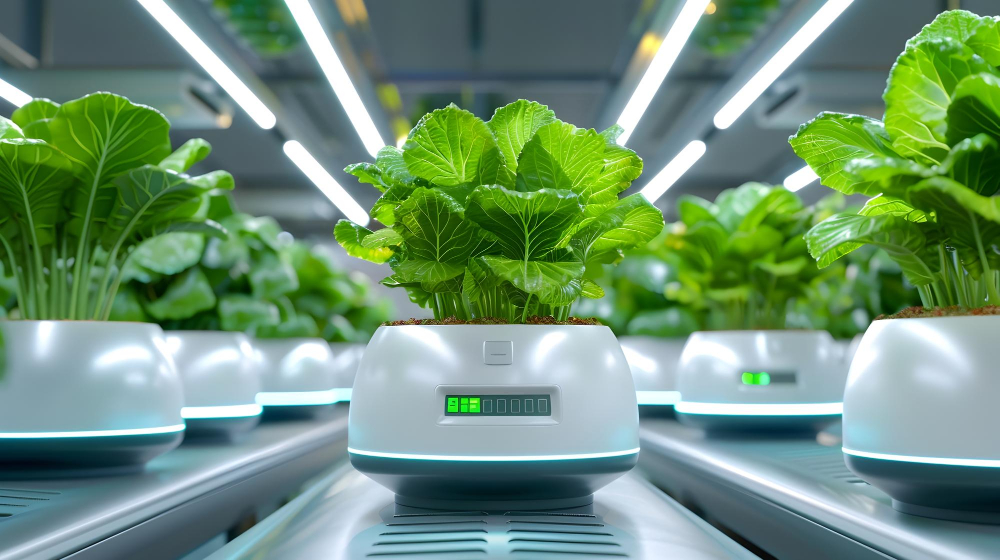Hydroponics is already transforming the way we grow food — saving water, maximizing yields, and enabling farming in places where soil-based agriculture is impossible. But the next big leap in hydroponics is being powered by Artificial Intelligence (AI). At Ponic Greens, we believe that integrating AI into hydroponic systems — especially for nutrient management — is the key to unlocking higher productivity, sustainability, and profitability.
Why Nutrient Management Matters in Hydroponics
In hydroponics, plants depend entirely on the grower for their nutrient supply. Unlike soil, which acts as a buffer, hydroponic systems require precise control of:
- pH levels
- Electrical conductivity (EC)
- Macronutrients (N, P, K, Ca, Mg, S)
- Micronutrients (Fe, Zn, Mn, Cu, B, Mo, Cl)
A small imbalance can reduce yield, slow growth, or even damage the entire crop. Traditionally, growers rely on manual monitoring and experience to adjust nutrient solutions — but this process can be time-consuming, error-prone, and inefficient.
How AI is Changing the Game
AI makes nutrient management smarter, faster, and more reliable by analyzing real-time data and automating decisions. Here’s how:
- Data-Driven Precision
AI systems collect data from pH, EC, temperature, humidity, and nutrient sensors. Using machine learning, the system predicts exactly how much of each nutrient the crop needs at every growth stage. - Automated Adjustments
Instead of manual mixing, AI-enabled dosing pumps automatically adjust the nutrient solution. This minimizes waste and ensures plants always receive the optimum balance. - Early Problem Detection
AI algorithms can detect patterns that signal nutrient deficiencies, toxicities, or diseases — often before visible symptoms appear. Growers can act early, protecting both yield and quality. - Personalized Crop Recipes
Every crop, and even every variety, has unique nutrient requirements. AI creates customized feeding “recipes” for lettuce, spinach, herbs, tomatoes, or strawberries, ensuring consistent results.
Benefits of AI-Driven Nutrient Management
- Higher Yields: Optimized nutrition means faster growth cycles and healthier crops.
- Resource Efficiency: Reduced water and nutrient wastage translates to lower costs.
- Sustainability: AI reduces environmental impact by preventing over-fertilization.
- Scalability: Automated systems allow growers to manage larger operations with ease.
- Consistency: Uniform quality makes produce more attractive to consumers and retailers.
Real-World Applications
- Commercial Hydroponic Farms: Large greenhouses use AI to control thousands of plants simultaneously, maximizing profitability.
- Urban & Vertical Farms: Space-constrained farms can scale production without hiring more skilled labor.
- Home & Hobby Growers: Smart hydroponic kits with AI-driven nutrient control make farming accessible for beginners.
The Future: AI + IoT + Hydroponics
As AI integrates with the Internet of Things (IoT), hydroponic systems will become fully autonomous farms. Imagine a farm where sensors monitor plant health 24/7, AI makes instant nutrient adjustments, and mobile apps give growers full visibility — all while reducing costs and conserving resources.
At Ponic Greens, we are committed to bringing these innovations to our clients. By combining hydroponics with AI, we aim to build a future where fresh, nutritious, and sustainable food is available to everyone, everywhere.
Final Thought
AI-driven nutrient management isn’t just a trend — it’s the future of hydroponics. For growers, it means less guesswork and more growth. For communities, it means affordable, healthy produce. And for the planet, it means farming smarter, not harder.
Learn more about how Ponic Greens is shaping the future of smart hydroponics at ponicgreens.com.

